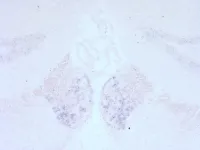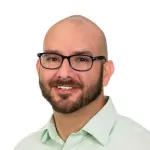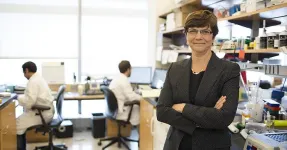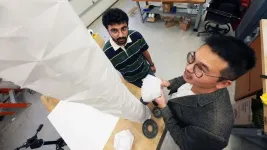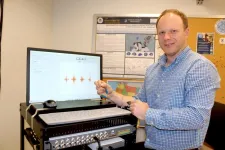(Press-News.org) A study of seriously ill patients from academic medical centers across the country has found that nearly a quarter had a delayed or missed diagnosis.
All the patients had either been transferred to the intensive care unit (ICU) after being admitted or died in the hospital. The researchers concluded that three-quarters of these diagnostic errors contributed to temporary or permanent harm, and that diagnostic errors played a role in about one in 15 of the deaths.
The most common errors identified in the study involved delayed rather than missed diagnoses, for example because a specialist was consulted too late or an alternate diagnosis was not considered soon enough, or because of problems ordering the correct test and interpreting the results.
Using statistical methods, they estimated that eliminating these problems with assessment and testing would reduce the risk for diagnostic errors by approximately 40%.
The study represents the largest assessment of diagnostic errors in which physicians reviewed each medical record. It appears Jan. 8, 2024, in JAMA Internal Medicine.
Academic medical centers often see the most challenging cases, and the data can help them increase patient safety by coaching physicians, improving communication between healthcare teams and patients, and developing more accurate diagnostic tools and techniques.
“Our study is similar to studies from the ‘90s describing the prevalence and impact of common patient safety events, such as medication errors, studies which catalyzed the patient safety movement,” the paper’s first author, Andrew Auerbach, MD, MPH, a professor in the UCSF in the Division of Hospital Medicine, said in reference to the groundbreaking 1999 Institute of Medicine report, “To Err is Human.” “We hope our work provides a similar call to action to academic medical centers, researchers and policymakers.”
The data may also be useful in designing artificial intelligence (AI) that can summarize lengthy medical records, suggest alternative diagnoses when patients fail to improve and ensure that the correct tests are ordered.
A national collaboration to improve safety
The study involved the 29 academic medical centers that are participating in the Hospital Medicine ReEngineering Network, a quality improvement collaborative that includes Beth Israel Deaconess Medical Center, Brigham and Women’s Hospital, Johns Hopkins Hospital, Massachusetts General Hospital, the Mayo Clinic, UCSF Medical Center, Yale New Haven Hospital and Zuckerberg San Francisco General Hospital and Trauma Center.
While the study centered on some of the most respected medical centers in the country, the authors cautioned that the results may not generalize to all acute care hospitals.
The research was drawn from a pool of more than 24,000 hospitalized adults who were transferred to the ICU on their second hospital day or died in the hospital between Jan. 1, 2019, and Dec. 31, 2019. Patients who had been transferred to the ICU from the emergency department were excluded to eliminate cases that had been misdiagnosed there.
The researchers randomly selected cases from this large pool, settling on a final group of 2,428. The patients were extremely ill, and three-quarters (1,863) died in the hospital. The physicians first examined every chart for the presence or absence of diagnostic errors, then evaluated whether the mistake had caused harm. Two physicians who had been trained to identify errors reviewed each record, and a third was on hand to settle any disagreements.
Of the reviewed cases, 550 patients, or 23%, experienced a diagnostic error. The errors caused temporary or permanent injury or death in 436 of those patients. The researchers concluded that diagnostic error was a contributing factor in 121 of the deaths.
“We know diagnostic errors are dangerous, and hospitals are obviously interested in reducing their frequency, but it’s much harder to do this when we don’t know what’s causing these errors or what their direct impact is on individual patients,” said senior author Jeffrey L. Schnipper, MD, MPH, of the Brigham’s Division of General Internal Medicine and Primary Care. “We found that diagnostic errors can largely be attributed to either errors in testing, or errors in assessing patients, and this knowledge gives us new opportunities to solve these problems.”
How AI can help physicians
The researchers say the study highlights the need to improve clinician training, evaluate physician workloads and develop more accurate diagnostic tools and techniques. This could include using AI to evaluate patients, select the most appropriate tests and reduce delays, although care must be taken to ensure the models are performing correctly without introducing errors or widening health disparities.
“In the end, helping physicians become better diagnosticians means coaching and training physicians, and helping physicians clearly explain diagnoses to patients,” Auerbach said. “I suspect AI will help with many tasks, but we still have work to improve communication between patients and healthcare team members to fully advance the field.”
This study was supported by the U.S. Department of Health and Human Services’ Agency for Healthcare Research and Quality (AHRQ). Since 2019, AHRQ has received dedicated funding from Congress to support diagnostic excellence. This includes 10 Diagnostic Safety Centers of Excellence funded in 2022, one of which was awarded to UCSF.
Preventing diagnostic errors is also the focus of UCSF's new Coordinating Center for Diagnostic Excellence.
Authors: Additional UCSF co-authors include Tiffany M. Lee, Colin C. Hubbard, PhD, Sumant R. Ranji, MD, Armond M. Esmaili, MD, Peter Barish, MD, Cynthia Fenton, MD, and Molly Kantor, MD.
Funding: The Agency for Healthcare Research and Quality (R01HS027369).
About UCSF: The University of California, San Francisco (UCSF) is exclusively focused on the health sciences and is dedicated to promoting health worldwide through advanced biomedical research, graduate-level education in the life sciences and health professions, and excellence in patient care. UCSF Health, which serves as UCSF's primary academic medical center, includes top-ranked specialty hospitals and other clinical programs, and has affiliations throughout the Bay Area. UCSF School of Medicine also has a regional campus in Fresno. Learn more at https://ucsf.edu, or see our Fact Sheet.
###
Follow UCSF
ucsf.edu | Facebook.com/ucsf | YouTube.com/ucsf
END
Diagnostic errors are common in seriously ill hospitalized adults
Data from across the country can improve patient safety with faster, better diagnosis.
2024-01-09
ELSE PRESS RELEASES FROM THIS DATE:
Scripps Research scientists give new insight into a molecular target of alcohol
2024-01-09
LA JOLLA, CA— Ethanol—the compound found in alcoholic beverages—interferes with the normal functioning of a long list of biological molecules, but how each of these interactions contributes to the behavioral effects of alcohol is not fully understood. A guiding, but elusive, goal of researchers is to identify the protein (or proteins) to which ethanol binds that makes some people vulnerable to excessive drinking. Solving this question would point the way to effective therapies for alcohol use disorder, ...
Coastal populations set to age sharply in the face of climate migration, FSU researcher finds
2024-01-09
As climate change fuels sea level rise, younger people will migrate inland, leaving aging coastal populations — and a host of consequences — in their wake, a study by Florida State University researchers finds.
While destination cities will work to sustainably accommodate swelling populations, aging coastal communities will confront stark new challenges, including an outflow of vital human infrastructure such as health care workers, said Associate Professor of Sociology Matt Hauer, lead author of the study published in the Proceedings of the National Academy of ...
World-renowned surgeon named new director of Moores Cancer Center at UC San Diego Health
2024-01-09
Following an extensive national search, Diane M. Simeone, MD, has been appointed director of Moores Cancer Center at UC San Diego Health, effective April 1, 2024.
Simeone brings robust institutional, national and international leadership experience to both oncologic patient care and scientific research, with a focus on establishing novel models of interdisciplinary collaboration. She is an internationally recognized surgeon-expert in the biology and multidisciplinary treatment of pancreatic neoplasms, with an active clinical practice in pancreatic surgery.
Simeone currently serves as the Laura and Isaac Perlmutter ...
Origami-inspired robotic plants grow with their environment
2024-01-08
How do you deploy an environmental sensor to collect climate change readings over a prolonged period on an uninhabited island without failing? How do you power a seismic detector to operate for months in an underwater cave?
In environments that are difficult to reach because of the hazards or hardships for humans, a device behaving like a native plant could be the answer. This is the approach taken by Suyi Li, associate professor in mechanical engineering at Virginia Tech, and Clemson professor and collaborator Ian Walker. Their work is being advanced ...
New research identifies high rates and common causes of diagnostic errors in hospitals across the nation
2024-01-08
Almost a quarter of patients who were admitted to the ICU or died in 29 hospitals in the United States experienced a diagnostic error
Efforts and initiatives are underway across the country to address and prevent the causes of diagnostic errors
A new study from researchers from Brigham and Women’s Hospital, a founding member of the Mass General Brigham healthcare system, in collaboration with researchers at the University of California San Francisco, has shed light on the rate and impact of diagnostic errors in hospital settings. In an analysis of electronic health records from 29 hospitals across the country of 2,428 patients who ...
Final supernova results from Dark Energy Survey offer unique insights into the expansion of the universe
2024-01-08
In 1998, astrophysicists discovered that the universe is expanding at an accelerating rate, attributed to a mysterious entity called dark energy that makes up about 70% of our universe. While foreshadowed by earlier measurements, the discovery was somewhat of a surprise; at the time, astrophysicists agreed that the universe’s expansion should be slowing down because of gravity.
This revolutionary discovery, which astrophysicists achieved with observations of specific kinds of exploding stars, called type Ia (read “type one-A”) ...
Life span increases in mice when specific brain cells are activated
2024-01-08
In recent years, research has begun to reveal that the lines of communication between the body’s organs are key regulators of aging. When these lines are open, the body’s organs and systems work well together. But with age, communication lines deteriorate, and organs don’t get the molecular and electrical messages they need to function properly.
A new study from Washington University School of Medicine in St. Louis identifies, in mice, a critical communication pathway connecting the brain and the body’s fat tissue in a feedback loop ...
Robotic rehab aims to help stroke patients regain hand dexterity
2024-01-08
Every year, about 800,000 new stroke cases are reported in the United States, often causing patients problems with both neurological and physical motor control. Disruptions in the mobility of the arms and hands, in particular, can have devastating impacts on stroke patients’ quality of life.
The restoration of arm extremity and hand dexterity are often the highest priority among stroke patients. A new robotic platform developed at the University of Rhode Island, which utilizes both a patient’s brainwaves and muscle activity, aims to help post-stroke patients perform needed rehabilitation and regain critical motor skills, including complex tasks like reaching and grasping ...
Illinois Tech launches sensor technology program with emphasis on veteran education
2024-01-08
CHICAGO—January 8, 2023—Illinois Institute of Technology (Illinois Tech) has received a substantial grant from the National Science Foundation (NSF) to launch a pioneering education program in sensory technology aimed at underrepresented groups—particularly veterans. The initiative, funded through NSF’s Experiential Learning for Emerging and Novel Technologies (ExLENT) program, underscores Illinois Tech’s commitment to critical future technologies and expanding education to groups that have historically ...
Study highlights barriers to contraceptive access for disabled Medicare enrollees
2024-01-08
PITTSBURGH — Contraceptive use is low among reproductive-aged people with disabilities who are enrolled in Medicare, according to a new study from the University of Pittsburgh that highlights how lack of contraceptive coverage by Medicare may prevent disabled enrollees from accessing contraception.
Published today in the January issue of Health Affairs, the study provides the first national overview of contraceptive use among enrollees in Medicare, the government health insurance for people over 65 and for people with qualifying disabilities. ...
LAST 30 PRESS RELEASES:
ASU researchers to lead AAAS panel on water insecurity in the United States
ASU professor Anne Stone to present at AAAS Conference in Phoenix on ancient origins of modern disease
Proposals for exploring viruses and skin as the next experimental quantum frontiers share US$30,000 science award
ASU researchers showcase scalable tech solutions for older adults living alone with cognitive decline at AAAS 2026
Scientists identify smooth regional trends in fruit fly survival strategies
Antipathy toward snakes? Your parents likely talked you into that at an early age
Sylvester Cancer Tip Sheet for Feb. 2026
Online exposure to medical misinformation concentrated among older adults
Telehealth improves access to genetic services for adult survivors of childhood cancers
Outdated mortality benchmarks risk missing early signs of famine and delay recognizing mass starvation
Newly discovered bacterium converts carbon dioxide into chemicals using electricity
Flipping and reversing mini-proteins could improve disease treatment
Scientists reveal major hidden source of atmospheric nitrogen pollution in fragile lake basin
Biochar emerges as a powerful tool for soil carbon neutrality and climate mitigation
Tiny cell messengers show big promise for safer protein and gene delivery
AMS releases statement regarding the decision to rescind EPA’s 2009 Endangerment Finding
Parents’ alcohol and drug use influences their children’s consumption, research shows
Modular assembly of chiral nitrogen-bridged rings achieved by palladium-catalyzed diastereoselective and enantioselective cascade cyclization reactions
Promoting civic engagement
AMS Science Preview: Hurricane slowdown, school snow days
Deforestation in the Amazon raises the surface temperature by 3 °C during the dry season
Model more accurately maps the impact of frost on corn crops
How did humans develop sharp vision? Lab-grown retinas show likely answer
Sour grapes? Taste, experience of sour foods depends on individual consumer
At AAAS, professor Krystal Tsosie argues the future of science must be Indigenous-led
From the lab to the living room: Decoding Parkinson’s patients movements in the real world
Research advances in porous materials, as highlighted in the 2025 Nobel Prize in Chemistry
Sally C. Morton, executive vice president of ASU Knowledge Enterprise, presents a bold and practical framework for moving research from discovery to real-world impact
Biochemical parameters in patients with diabetic nephropathy versus individuals with diabetes alone, non-diabetic nephropathy, and healthy controls
Muscular strength and mortality in women ages 63 to 99
[Press-News.org] Diagnostic errors are common in seriously ill hospitalized adultsData from across the country can improve patient safety with faster, better diagnosis.
